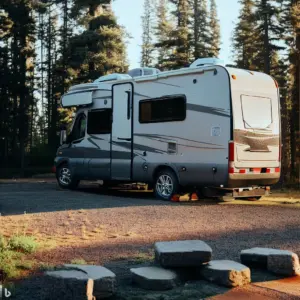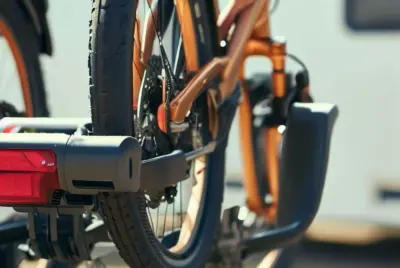The Ultimate Guide to RV Leveling Blocks
As an RV owner, one of the most important aspects of enjoying your next adventure is ensuring that your rig is on a level playing field. Uneven terrain can not only create discomfort while parked but also cause damage to appliances and equipment inside your camper. This is where RV leveling blocks come into the picture – these durable and versatile accessories are a must-have for every motorhome and camper owner.
Leveling blocks are designed to provide stability and support to your RV, ensuring that it remains safe and comfortable while parked at a campsite. Whether you’re a full-time RVer or an occasional camper, a reliable leveling system is essential for a hassle-free experience. In this article, we will delve into the world of RV leveling blocks, exploring the best options, their benefits, and why they are a crucial addition to your RV equipment arsenal.
Why are RV leveling blocks necessary?
When parking your RV on uneven ground, the tires may not properly contact the surface, causing the vehicle to tilt or lean to one side. This affects your comfort inside the RV and puts unnecessary stress on the suspension and other components. Using blocks ensures that your RV is properly leveled, providing a better experience for you and preventing any potential damage to your vehicle.
How do RV leveling blocks work?
They are typically made of durable materials such as high-density plastic and are stackable. They come in different sizes and shapes, allowing you to customize the height and position of your vehicle.
Start by identifying the low side of your RV. Place the blocks on the ground in front of the low-side tires. Drive your RV slowly onto the blocks, using a spotter if necessary, and stop once it is leveled. Repeat the process on the other side if needed.
Importance of a proper RV leveling system
Having a reliable RV leveling system is crucial for a comfortable camping experience. It enhances your comfort inside the RV and ensures that appliances and fixtures, such as refrigerators and sinks, work properly. Plus, a well-leveled RV reduces the risk of items shifting or falling while you’re on the road.
Additional stabilization with RV leveling jacks
While RV leveling blocks provide a solid foundation, using RV stabilizer jacks for added stability is also beneficial. These jacks are designed to support the weight of your RV and minimize any rocking or swaying motion when parked. You can achieve maximum stability and peace of mind during your camping adventures by using RV leveling jacks in conjunction with leveling blocks.
When selecting stabilizer jacks, look for ones that are compatible with your RV’s leveling system and provide adequate weight capacity. Sturdy stabilizer jacks will significantly enhance your RV’s overall stability and comfort, ensuring a worry-free camping experience.
The Best Materials for RV Leveling Blocks
Plastic RV leveling blocks: Lightweight and durable
 When choosing the best material, plastic is undoubtedly a top contender. Plastic blocks offer several advantages, making them popular among RV enthusiasts. First and foremost, they are lightweight, making them easy to transport and store. Whether traveling long distances or needing to move your position frequently, plastic blocks won’t add unnecessary weight to your setup.
When choosing the best material, plastic is undoubtedly a top contender. Plastic blocks offer several advantages, making them popular among RV enthusiasts. First and foremost, they are lightweight, making them easy to transport and store. Whether traveling long distances or needing to move your position frequently, plastic blocks won’t add unnecessary weight to your setup.
Furthermore, the plastic versions are incredibly durable. They are designed to withstand the weight of your RV, providing a stable and secure base. You don’t have to worry about them cracking or crumbling under pressure, ensuring their longevity and reliability throughout your camping trips.
Aluminum RV leveling blocks: Strength and versatility
If you’re looking for a more robust option, aluminum ones are worth considering. Aluminum is known for its strength and durability, making it ideal for heavy-duty applications. These blocks can handle the weight of larger RVs, providing stability and peace of mind during your camping adventures.
Additionally, aluminum RV leveling blocks offer versatility. They often come with adjustable heights, allowing you to fine-tune the leveling process to meet your specific needs. Whether you’re dealing with slightly uneven terrain or a more challenging slope, aluminum blocks can be easily adjusted to ensure perfect leveling.
Do You Really Need RV Leveling Blocks for Your RV?
While leveling blocks may not be mandatory for all RVs, they offer many benefits that can greatly enhance your camping experience.
The Advantages of RV Leveling Blocks
Stability and Comfort
Leveling your RV ensures that you have a solid base to park on, reducing the chance of the RV rocking or swaying when you move around inside. This stability enhances your overall comfort and prevents any accidents that may occur due to an unlevel surface.
Protection for Your RV
When parked on an uneven surface, the weight distribution of your RV can be imbalanced, causing unnecessary strain on different parts of the vehicle. By leveling your RV with blocks, you can ensure an even weight distribution, reducing the risk of damage to the frame or suspension.
Improves Functionality
An RV leveling system consisting of leveling blocks and stabilizing jacks greatly improves the functionality of your RV. When your RV is level, it allows for better performance of appliances such as refrigerators and air conditioners, which rely on being on an even surface to work optimally. So, if you want your RV’s amenities to function at their best, investing in leveling blocks is a wise decision.
Assessing Your RV’s Needs
Now that we understand the benefits of leveling blocks, assessing whether your RV truly requires them is important. Here are a few factors to consider:
Type of RV
Different types of RVs have varying levels of stability. Smaller camper vans or Class B RVs often have a lower center of gravity, making them more stable on uneven surfaces. However, larger motorhomes or fifth-wheel trailers may require leveling blocks due to their higher profile and weight distribution.
Campground Conditions
The type of campgrounds you frequent also plays a role in determining the need for leveling blocks. You may not require a leveling system if you predominantly stay at modern campsites with level concrete pads. However, if your adventures take you off the beaten path to more rustic campsites, leveling blocks become a valuable tool to ensure a comfortable and stable RV setup.
Personal Preference
Lastly, personal preference should also be taken into consideration. Some RV enthusiasts prioritize stability and comfort, while others may be content with a slightly uneven setup. Assessing your comfort level and the importance you place on a level RV will help you decide whether RV levelers are necessary.
Don’t let an uneven parking spot dampen your RV adventures. Get some reliable RV leveling blocks, a quality leveling system, and stabilizing jacks, and confidently hit the road!
Can I Stack Multiple RV Leveling Blocks Together?
The answer is…yes! Stacking RV leveling blocks can be a great solution for achieving your recreational vehicle’s perfect level and stable position. Let me explain why.
Understanding RV Leveling Systems and Jacks
To fully comprehend the stacking process, it’s crucial to have a basic understanding of RV leveling systems and jacks. Most modern RVs come equipped with either stabilizing jacks or leveling jacks. Stabilizing jacks are mainly used to minimize your RV’s shaking and swaying motion once it’s already level. On the other hand, leveling jacks are typically used to raise or lower specific corners or sides of the RV to achieve a level position.
The Stacking Process
 Let’s return to the main question: Can you stack multiple RV leveling blocks together? The answer is a resounding yes! Stacking leveling blocks can help you achieve the desired levelness when you don’t have enough blocks of a particular height.
Let’s return to the main question: Can you stack multiple RV leveling blocks together? The answer is a resounding yes! Stacking leveling blocks can help you achieve the desired levelness when you don’t have enough blocks of a particular height.
To stack the blocks effectively, follow these steps:
- Start by positioning your RV on a relatively flat surface.
- Place the first leveling block on the ground, ensuring it’s securely underneath one of your RV tires.
- If the levelness isn’t achieved, place a second block on top of the first one, creating a higher platform.
- Depending on the height needed, you can continue stacking more blocks until the desired levelness is achieved.
- Finally, test the stability by gently rocking your RV from side to side. You’ve successfully stacked and positioned the leveling blocks if it’s stable and level.
Benefits of Stacking RV Leveling Blocks
Stacking offers several benefits, including:
- Flexibility: Stacking allows you to adapt to various ground conditions, regardless of their unevenness.
- Cost-effective: Instead of purchasing multiple blocks of different heights, you can make the most of the blocks you already have by combining them.
- Easy setup: Stacking blocks is a straightforward process that can be done quickly and efficiently.
- Versatility: It enables you to achieve the precise levelness you desire, ensuring a comfortable and secure camping experience.
Choosing the Right Size of RV Leveling Blocks: A Guide for Enthusiasts
However, choosing the right size of leveling blocks can be a perplexing task for many. In this section, I will share some helpful suggestions and reasons for selecting the perfect ones for your vehicle.
Consider the Weight and Size of Your RV
The first step is to consider the weight and size of your RV. Each type of leveling block has a weight rating and maximum height capacity. To ensure stability and prevent any accidents, it is crucial to select leveling blocks that can handle the weight of your RV.
Consider the weight of your RV when fully loaded with all your supplies and equipment. It’s advisable to choose models with a higher weight rating to account for any unforeseen circumstances or the addition of accessories.
Determine the Required Height and Quantity
Next, you need to determine the required height and quantity. Assess the height difference between the lowest side of your RV and the ground. This can be done using a leveling system or by using a simple bubble level.
Ensure that you can provide enough height to eliminate the unevenness and bring your RV to a level position. If the height difference is significant, you may need to stack multiple blocks to achieve the desired level.
Consider Durability and Stability
It’s important to prioritize durability and stability. Look for high-quality materials, such as heavy-duty plastic or sturdy resin, that can withstand the weight of your RV and resist wear and tear. Opt for blocks with a non-slip surface or additional features like interlocking grooves that provide added stability and prevent shifting while parking your RV.
Convenience and Portability
Lastly, take into account the convenience and portability of the RV levelers. You want to minimize the hassle of setting up and packing up your leveling blocks. Look for lightweight and easy-to-store models, preferably with a carrying case or bag for easy transportation.
Alternative Methods to RV Leveling Blocks
Finding the Perfect Balance for Your RV
Having a stable and level rig during camping trips is essential. However, if you find yourself in a situation where leveling blocks are not readily available, fret not! Alternative methods can help you achieve a stable and leveled RV.
Utilize an RV Leveling System
Investing in an RV leveling system can be a game-changer. These systems utilize hydraulic technology to level your RV automatically with just a button push. By installing leveling jacks on your RV, you can enjoy hassle-free leveling without the need for blocks. These advanced systems save you time and effort and provide a precise and accurate leveling experience.
Explore Stabilizing RV Jacks
These jacks are designed to provide stability and support to your RV, even on uneven surfaces. You can minimize any rocking or swaying motion by strategically placing these jacks at key points underneath your rig. Stabilizing jacks work by extending and retracting to adjust the height and level of your RV, ensuring a comfortable camping experience.
Consider Other Stability Enhancing Accessories
One example is a wheel chock. Wheel chocks are small blocks or wedges that prevent your RV from rolling or sliding. You can increase stability and prevent unwanted movement by placing wheel chocks on both sides of your tires.
Ensuring Safety and Stability
It is essential to prevent your RV from tilting or unevenly balancing. This affects your overall comfort inside the vehicle and the functionality of various built-in appliances and systems. Without proper leveling, your fridge might not cool efficiently, the doors may not close properly, and water might not drain from the shower or sink as expected. Moreover, leveling your RV ensures the smooth operation of the slide-outs and prevents unnecessary strain on the frame.
Proper Placement and Usage
It’s important to follow a few guidelines to level your RV using blocks effectively. Begin by parking your RV on a relatively level surface. Once parked, assess the leveling requirements by using a leveling tool or app on your smartphone. Identify which side or area needs to be raised, and place the leveling blocks accordingly.
When choosing the blocks’ placement, it is advisable to position them beneath the tires or stabilizing jacks. By elevating these areas, you can achieve a balanced and stable foundation. Always remember to follow the manufacturer’s instructions and guidelines.
Additional Safety Considerations
It is crucial to ensure your safety and the safety of others. Here are a few key considerations:
- Chock the tires: To prevent any unintentional movement of your RV, always chock the wheels that are not being elevated. This provides an extra layer of safety and stability.
- Regular inspection: Regularly inspect equipment for any signs of wear, cracks, or damage. Damaged blocks should be replaced immediately to maintain optimal safety.
- Secure your RV: Once your RV is leveled and stabilized, take the time to secure it properly. Engage the stabilizer jacks and use additional stabilizing systems, if available, to prevent any unnecessary movement.
Embrace the Ease and Convenience of RV Leveling Blocks
By investing in high-end RV leveling blocks, you are taking a proactive step towards optimizing your camping experience. These versatile accessories ensure the stability and safety of your rig and protect the appliances and equipment inside from damage caused by uneven ground. From Lynx levelers and rubber mats as jack pads to scissor jacks and auto leveling systems, there are a variety of options available to cater to the specific needs of your motorhome or camper whether you are on soft surfaces, using heavy or light trailers, auto leveling or manually leveling your RV.
Whether you choose to manually level your RV or add auto-leveling systems to your rig, the importance of a reliable and durable leveling block cannot be overstated. With features like corrosion-resistant finishes and easy storage options, leveling blocks offer convenience and peace of mind to RV owners of all levels of expertise. So, pack them in your carry bag, fast forward to your next campsite, and elevate your RVing experience with the best RV leveling blocks on the market. Your future adventures await, and with RV leveling blocks by your side, you can confidently embrace them with stability and ease.
FAQS
Can leveling blocks be used to level a Class B or camper van?
Leveling blocks can be used to level a Class B or camper van. However, it is important to ensure that the blocks can handle the vehicle’s weight and that they are placed securely to avoid any accidents.
How many leveling blocks do I need for my RV?
The number of leveling blocks needed for an RV depends on the specific leveling requirements of your vehicle. Generally, it is recommended to have at least four leveling blocks for each tire or corner that needs leveling.
Can leveling blocks be used on uneven or sloping surfaces?
Yes, leveling blocks can be used on uneven or sloping surfaces. They are designed to provide stability and raise the low side of the RV to bring it to a level position. However, caution should be exercised on extremely steep or unstable surfaces.
Are leveling blocks necessary if my RV has automatic leveling jacks?
Automatic leveling jacks can be convenient, but leveling blocks can still be helpful in certain situations. For example, if the ground is severely sloped or there is an issue with the automatic leveling system, using leveling blocks can provide additional stability and leveling.
Can leveling blocks damage my RV’s tires?
When used correctly, leveling blocks should not damage your RV’s tires. However, it is important to ensure that the blocks are placed securely and that the weight of the RV is evenly distributed on them. Regular visual inspection of the tires for signs of wear or damage is also recommended.




